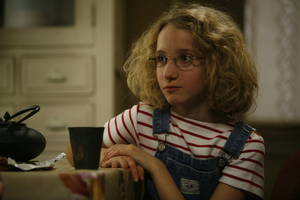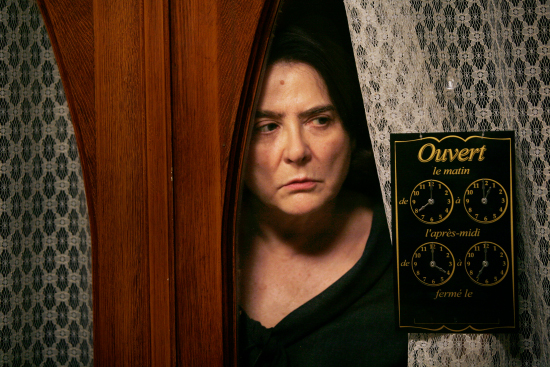Movie Review: Daytime in Paris — A Far Better Movie
The Hedghog’s steady, slow pacing—so rare in any film today—captures the rhythms of haut bourgeois life in Paris and draws out the nuances of how people change and are changed by relationships everywhere.
The Hedgehog (Le herisson). Directed by Mona Achache. At the Kendall Square Cinema, West Newton Cinema, and other screens throughout New England.

Garance Le Guillermic stars as eleven-year-old Paloma in THE HEDGEHOG. Photo: Neoclassics Films Ltd.
There are no explosions in The Hedgehog, no car chases, no sexual encounters, no violence, none of the staples of recent American films. Just a story about three unusual and brilliantly acted characters who live in a small, exclusive building on a quiet Paris streets in a wealthy arrondissement.
The first is a precocious 12-year-old girl named Paloma, who has commandeered her government minister father’s video camera and spends her days filming what she has decided will be the last months of her life. The second is the concierge Madame Michel who, despite her proximity to the four tenants whose lives she is part of, remains almost entirely unknown to them. The third is Mr. Ozu—a courtly, Japanese grandfather and millionaire who moves into the house when one of its occupants dies.
Madame Michel is the Hedgehog, a prickly, scruffy, unglamorous being on the outside but hiding an elegant and refined interior. Paloma discovers it when she enters the concierge’s kitchen one day and discovers an pen book and a bar of dark chocolate. Mr. Ozu stumbles upon it when the concierge mutters “All happy families are alike.” The Japanese gentleman and the 12-year-old French girl (who is studying Japanese in school) soon share their impression that the concierge is not at all what she seems to be.
The film—a debut feature—is directed by 30-year-old Mona Achache who also adapted it from the French novel The Elegance of the Hedgehog. Her casting and steady, slow pacing—so rare in any film today—captures the rhythms of haut bourgeois life in Paris and draws out the nuances of how people change and are changed by relationships everywhere.
Garance Le Guillermic who plays Paloma never falls into cutsieness and retains the appeal of an Eloise or young Nancy Drew. The handsome, twinkly, and subtle Togo Igawa, last seen in Memoirs of a Geisha, is a fairy godmother in the guise of a Japanese magnate; and Josiane Balasko is both stolid and riveting as Madame Michel.
Go see this soon, before it disappears like that other wonderful French film Queen to Play.
Helen Epstein is the translator of Acting in Terezin and the author of Joe Papp and other work on Kindle.
Tagged: Culture Vulture, french, Mona Achache, The Elegance of the Hedgehog

